Numerous stray dogs with sorrowful eyes wander the streets, searching for a little bit of love and compassion.
Today’s story is about an exhausted homeless pup who went from door to door, asking humans for food and shelter.
Since very few people helped her, the canine had no other choice but to look for food in the trash.
Sadly, the children in the village chased her and caused her injuries.
Feeling disappointed and hurt, the little pooch stopped trusting humans and she decided to stay away from them.
Will anybody extend her a helping hand and fill her heart with hope for a better tomorrow?
Rescuers Come To Her Aid
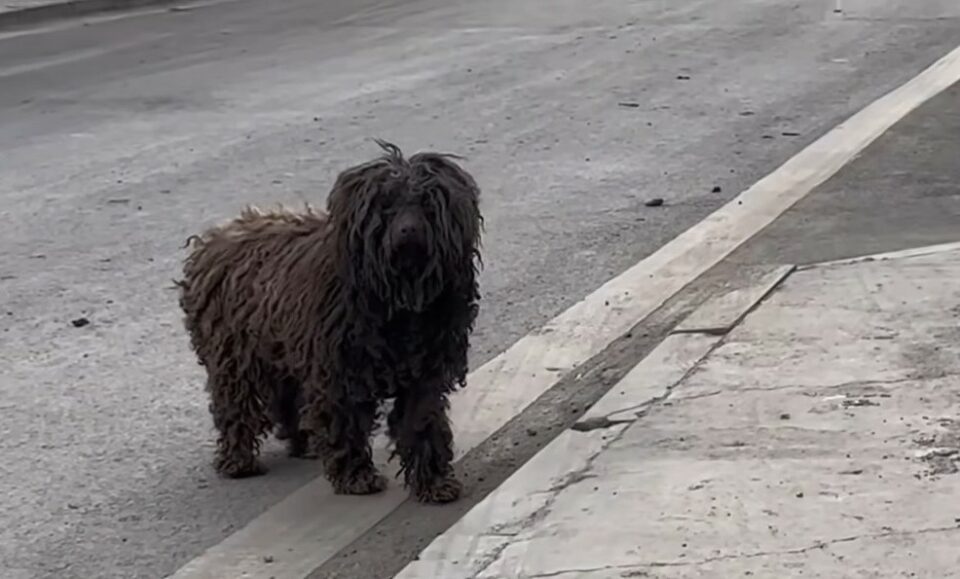
Fortunately, the villagers called the rescuers and told them that there was a stray canine who was in desperate need of help.
One of the rescuers immediately headed to the location and found the dog on a deserted road. She was skinny and her fur was dirty and matted. The pup had a tired expression on her face.
The moment the rescuer saw her, she got out of the car and walked toward her.
Although she tried talking to her and consoling her, the stray canine didn’t trust her and she walked away.
The pooch was hurt too many times.
The rescuer felt sad after she saw that the pooch refused their help, but she didn’t give up. She followed the stray doggo.
The rescuer kept talking to her and offering her food.
Two hours later, the pooch finally gave in, and she let the good human come closer to her.
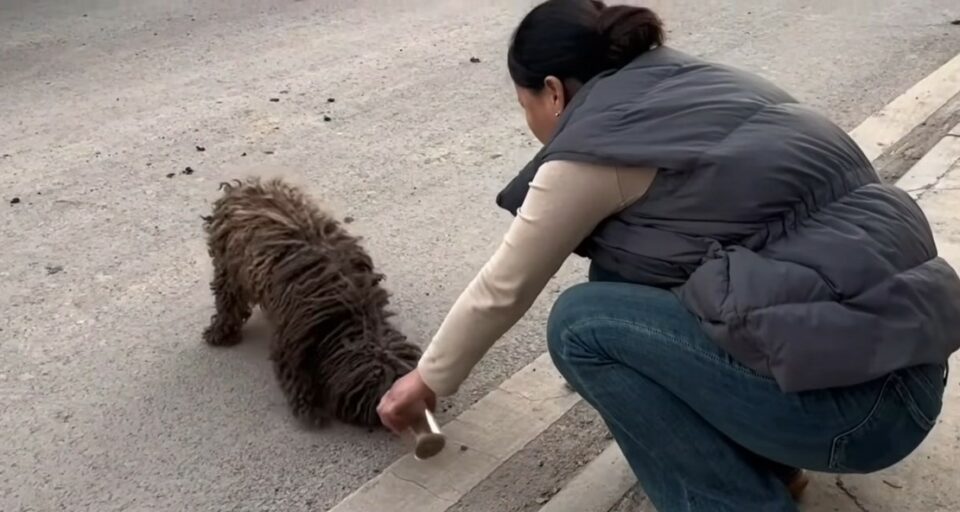
The doggo started believing that she was here to help. She quickly began eating the food the woman gave her as she was starving.
When the doggo agreed to come with her, the rescuer breathed a sigh of relief.
The Doggo Is Finally Safe
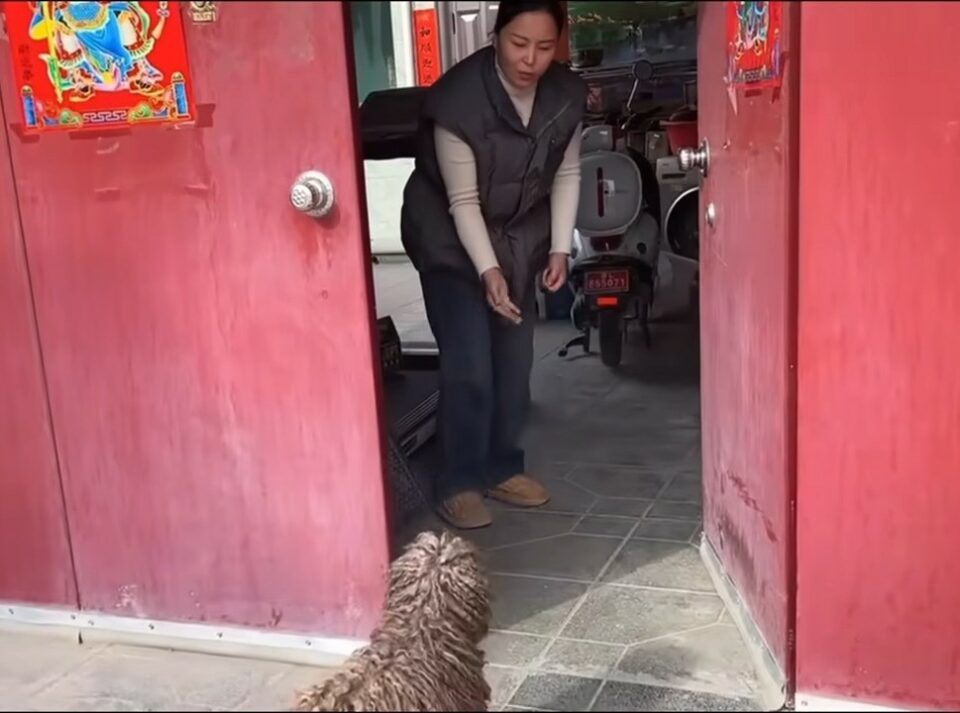
Once she arrived at her hero’s home, the canine was a bit reserved toward her. She was frightened to even enter her house.
The rescuer gave the pooch the time that she needed. She sat next to her and offered her words of encouragement.
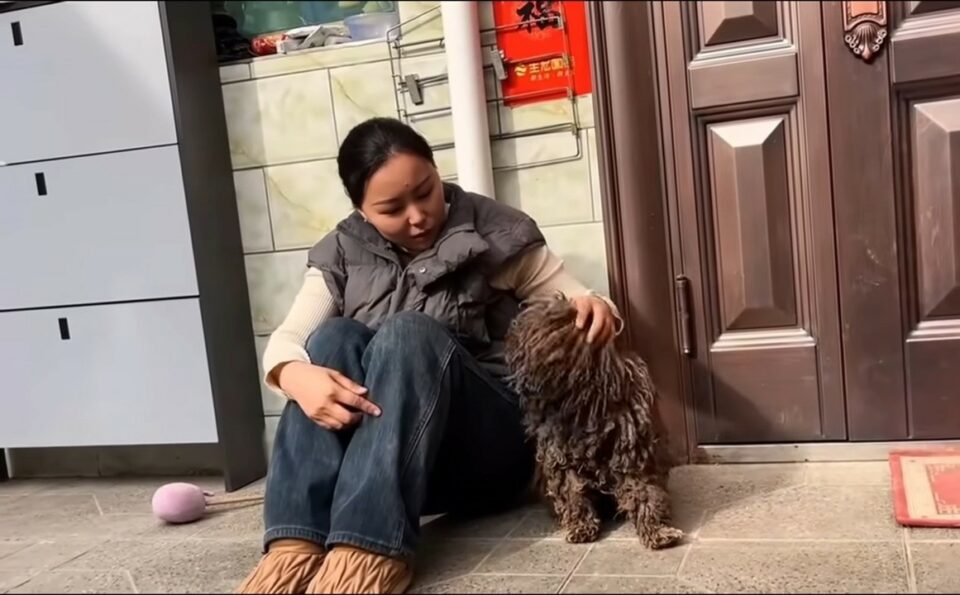
The pup felt safe, and she let the kind-hearted human take care of her.
After her rescuer removed the dog’s thick and dirty fur, she saw the small wounds on her body and a large wound on her abdomen.
The doggo felt happy after she got rid of the matted fur. She started jumping in the air and clasping her front paws as if she was giving thanks to her rescuer.
The good woman bathed her and took her for a walk so that she could get used to her new living environment.
The next morning, the pup looked better. She no longer felt tired.
At The Vet Clinic
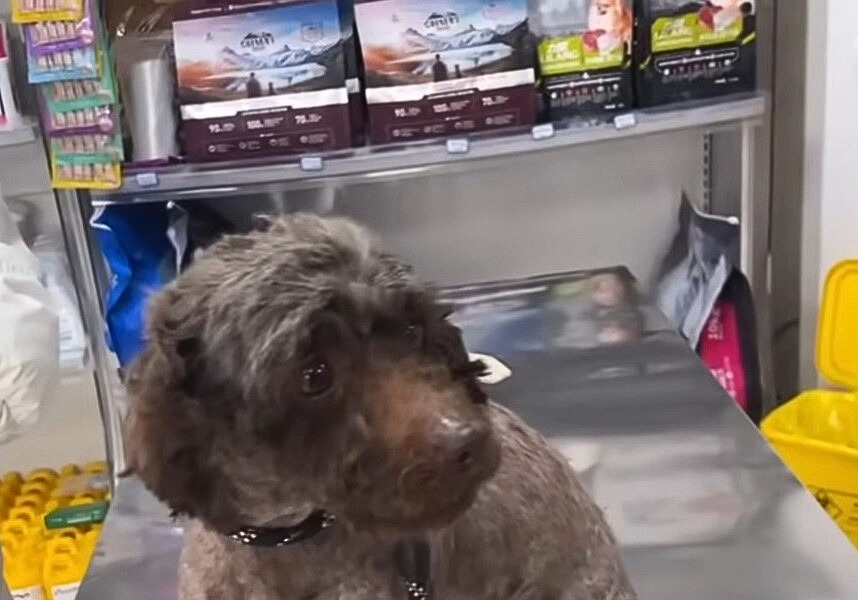
Her caregiver drove her to the vet.
Once they arrived at the vet clinic, the vet examined the dog’s wounds and determined that the large wound on her abdomen was actually a tumour.
The rescuer was relieved after the doctor told her that the tumour was benign and that it didn’t cause her any pain.
The vet gave the pup medicine for both the tumour and the other small wounds.
The dog’s caregiver kept treating her wounds, and she felt overjoyed when the tumour started shrinking.
The Pup Feels Happy
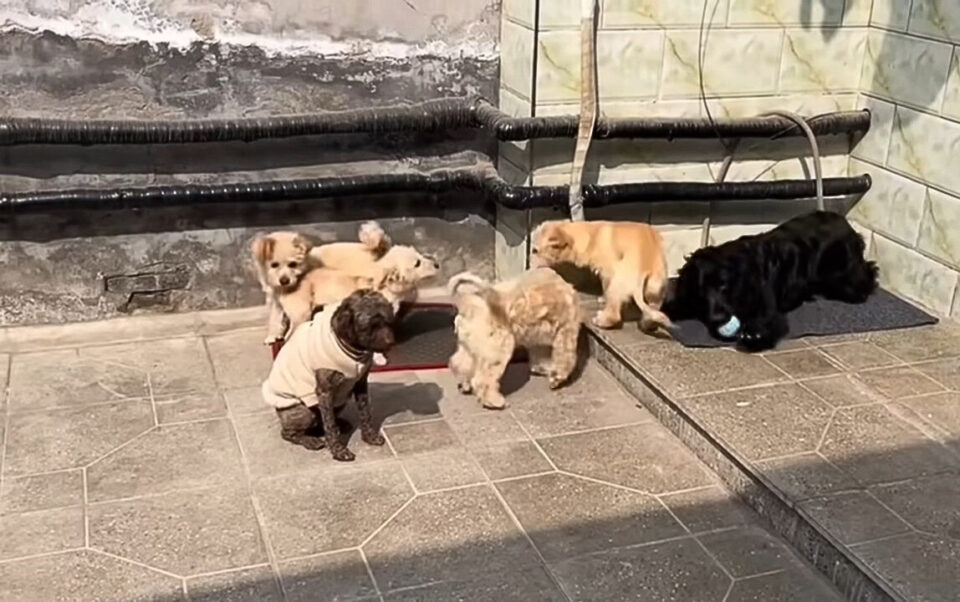
At her rescuer’s home, the pup met the other dogs who once lived on the street. Since all of them were abandoned, they felt compassion and love toward each other.
The doggo loved playing with them.
Whenever she looked at her rescuer, her eyes were filled with gratitude and joy.
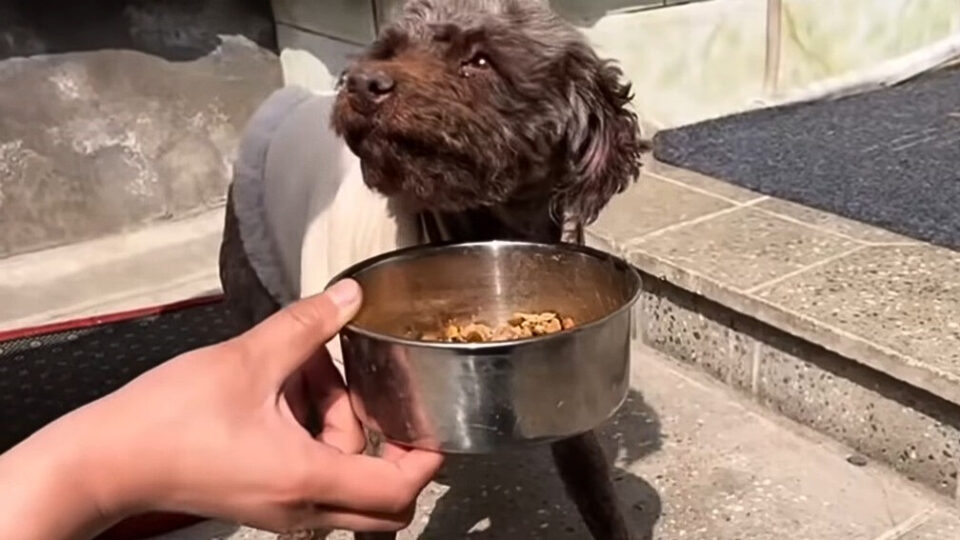
The pup knew that she had friends who would always be there for her.
The doggo’s caregiver continued treating the dog’s wounds, and they soon started healing.
The rescuer felt happy when the dog’s tumor shrank by half. She hoped that it would completely disappear.
Knowing that she found a good human who takes care of her and loves her fills my heart with joy.
I hope that the doggo made a full recovery. Thanks to the wonderful and compassionate rescuers, the pup will never be sad and lonely again.
If you’ve ever noticed your furry friend turning their nose up at the water bowl, you’re not alone. As a seasoned dog trainer, you understand the importance of proper hydration for your canine companion. But what do you do when your four-legged buddy seems uninterested in drinking water? It can be puzzling and concerning, but fear not, there are reasons behind this behavior that we’ll explore together.
Your dog’s reluctance to drink water could stem from various factors, from environmental changes to health issues. Understanding the reasons behind their behavior is crucial in ensuring your pup stays healthy and happy. So, grab a treat for your loyal companion and let’s uncover the mystery behind why your dog might be avoiding that essential H2O.
Understanding the Issue: Why Won’t My Dog Drink Water
Potential Medical Concerns
If your dog suddenly stops drinking water, it could be a sign of an underlying medical issue. Diseases like kidney problems, infections, or even dental pain can affect your dog’s thirst drive. In such cases, it’s crucial to consult your veterinarian to rule out any health concerns.
Behavioral Factors
Sometimes, your dog’s reluctance to drink water could be behavioral. Changes in their routine, stress, or anxiety can lead to decreased water intake. Ensure your dog has a comfortable and familiar drinking area, free from any disturbances. Encouraging them to drink by adding flavorless broth or wet food can also help increase their water consumption.
Remember, staying hydrated is vital for your furry friend’s overall health and well-being. Monitoring their water intake and addressing any issues promptly is key to ensuring they stay healthy and happy.
Assessing Dehydration in Dogs
Signs of Dehydration to Look Out For
Dehydration in dogs can have serious consequences, so it’s essential to be vigilant for signs that your furry friend may not be getting enough water. Some common indicators of dehydration in dogs include:
- Sunken eyes
- Dry gums
- Loss of skin elasticity
- Lethargy
- Panting excessively
- Thick saliva
If you notice any of these signs in your dog, it’s crucial to take action promptly to ensure they get the hydration they need.
- Sticky or dry gums
- Delayed capillary refill time
- Sunken appearance to the eyes
- Weakness or collapse
Regularly monitoring these indicators can help you catch dehydration early and take appropriate steps to keep your pup healthy and happy.
Common Reasons Behind Canine Aversion to Water
Dental Problems in Dogs
Dental issues can contribute to a dog’s reluctance to drink water. Painful conditions like gum disease, broken teeth, or mouth sores can make it uncomfortable for your furry friend to hydrate properly. If your dog avoids drinking water or shows signs of discomfort while doing so, it’s essential to have their oral health checked by a veterinarian promptly.
Changes in Water Taste or Source
Changes in the taste or source of water can also affect your dog’s water consumption. Just like humans, dogs can be picky about the quality or taste of their water. Factors like moving to a new house, using a different water bowl, or adding unfamiliar supplements to the water can lead to a decreased intake. Ensuring a consistent and clean water source that your dog enjoys can help encourage regular hydration.
Stress and Environmental Changes
Stressful situations or changes in the environment can impact your dog’s behavior, including their water intake. Dogs are sensitive creatures, and alterations in their routine, such as loud noises, new pets, or household renovations, can cause stress, leading to decreased water consumption. Providing a calm and comfortable space for your dog to drink water can help alleviate any anxiety-related aversion to hydration.
Proactive Measures to Encourage Hydration
Introducing Water Additives and Flavors
To make water more appealing to your dog, consider adding water additives or flavors designed for pets. These can entice your dog to drink more water, especially if they are hesitant due to changes in water taste or source.
The Role of Wet Food in Promoting Hydration
Incorporating wet food into your dog’s diet can help increase their overall water intake. Wet food contains a higher moisture content compared to dry kibble, contributing to your dog’s hydration. This can be especially beneficial for dogs that prefer food over plain water.
Ensuring Accessibility and Cleanliness of Water
Ensure that your dog has easy access to fresh, clean water throughout the day. Place water bowls in convenient locations around your home, and clean them regularly to prevent any bacteria growth or off-putting smells. A constant supply of fresh water will encourage your dog to stay hydrated.
When to Seek Veterinary Help
The Importance of Timely Medical Consultation
If your dog continues to show aversion to drinking water despite your efforts, it’s crucial to seek veterinary assistance promptly. Sudden changes in behavior, especially regarding essential activities like drinking water, can be indicators of underlying health issues. Your veterinarian can conduct a thorough physical examination and run necessary tests to identify any potential medical reasons contributing to your dog’s decreased water intake. Timely intervention can help prevent any complications and ensure your furry companion’s well-being.
What to Expect During the Vet Visit
During the veterinary visit, the veterinarian will assess your dog’s overall health and hydration levels to determine the underlying cause of their decreased water consumption. They may inquire about your dog’s diet, daily routine, and any recent changes in their environment. Be prepared to provide specific details about your dog’s behavior and any observed symptoms. The vet may recommend additional tests, such as blood work or urine analysis, to rule out medical conditions that could be impacting your dog’s water intake. Following the vet’s guidance and treatment plan is essential in addressing any health issues affecting your dog’s hydration.
Remember, your dog’s well-being is a top priority. Seeking professional veterinary help when needed is key to ensuring your furry friend stays healthy and hydrated.
Conclusion
Keeping your furry friend hydrated is crucial for their overall well-being. From dental issues to stress, various factors can affect your dog’s water intake. Remember, adding a bit of flavorless broth might entice them to drink more. Look out for signs of dehydration and act promptly if your dog continues to avoid water. Seeking veterinary help is essential to rule out any underlying health concerns. Your vet will assess your dog’s hydration levels, run tests if needed, and create a tailored treatment plan. Prioritizing your dog’s hydration and health is key to ensuring they lead a happy and active life.
Frequently Asked Questions
Why do some dogs avoid drinking water?
Dogs may avoid drinking water due to dental issues, changes in water taste or source, or stress, impacting their hydration levels.
How important is water consumption for dogs?
Proper hydration is crucial for dogs’ health as it supports various bodily functions and overall well-being.
What can be done to encourage a dog to drink more water?
Adding flavorless broth, ensuring fresh water availability, and using hydration-promoting methods can encourage increased water intake.
What are the signs of dehydration in dogs?
Signs of dehydration in dogs include dry gums, sunken eyes, lethargy, and loss of skin elasticity, indicating a need for immediate attention.
When should I seek veterinary help for my dog’s water intake issues?
Prompt veterinary assistance is crucial if a dog continues to avoid drinking water, as it could signal underlying health problems needing professional evaluation and treatment.
[no_toc]

Hey there, I’m Janet Brooks, a dog-loving student from California. I’m all about helping pups in need, especially those without homes. Me and my awesome friends work together to give shelter and love to stray dogs. Oh, and I also write blogs about dogs to share helpful info.